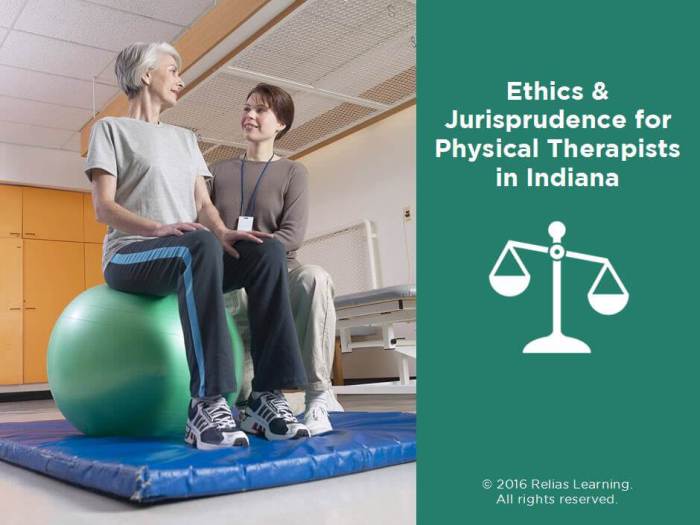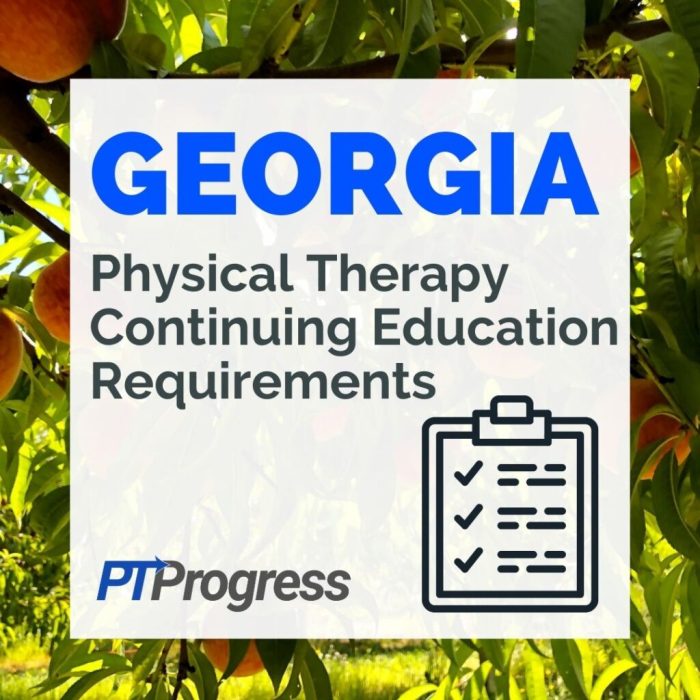Ethics and jurisprudence physical therapy georgia takes center stage, this opening passage beckons readers into a world crafted with good knowledge, ensuring a reading experience that is both absorbing and distinctly original. Ethics and jurisprudence are fundamental aspects of physical therapy practice in Georgia, shaping the ethical and legal responsibilities of physical therapists in their interactions with patients, colleagues, and the healthcare system.
This comprehensive guide delves into the ethical principles, legal considerations, and best practices that guide physical therapists in Georgia, providing a roadmap for ethical and compliant practice.
The content of the second paragraph that provides descriptive and clear information about the topic
Ethical Principles in Physical Therapy in Georgia
Physical therapists in Georgia are guided by a set of ethical principles that ensure the well-being and safety of their patients. These principles are Artikeld in the Georgia Physical Therapy Practice Act and enforced by the Georgia Board of Physical Therapy.
Georgia Physical Therapy Practice Act
The Georgia Physical Therapy Practice Act defines the scope of practice for physical therapists in the state. It includes ethical guidelines that address issues such as patient confidentiality, informed consent, and professional conduct.
Georgia Board of Physical Therapy
The Georgia Board of Physical Therapy is responsible for licensing and regulating physical therapists in the state. The board investigates complaints of unethical conduct and takes disciplinary action against physical therapists who violate the ethical guidelines.
Ethical Dilemmas Faced by Physical Therapists in Georgia
Physical therapists in Georgia may face ethical dilemmas in their practice, such as:
- Treating patients with conflicting values or beliefs
- Balancing patient autonomy with the need for medical intervention
- Maintaining confidentiality in cases of suspected abuse or neglect
Legal Considerations for Physical Therapists in Georgia

Physical therapists in Georgia must be aware of the legal framework governing their practice. This framework includes laws and regulations that address issues such as negligence, informed consent, and documentation.
Negligence
Negligence is a legal concept that refers to the failure to exercise reasonable care in performing a duty. Physical therapists can be held liable for negligence if they fail to meet the standard of care expected of a reasonably prudent physical therapist.
Informed Consent, Ethics and jurisprudence physical therapy georgia
Informed consent is a legal requirement that ensures that patients understand the risks and benefits of a medical procedure before agreeing to it. Physical therapists must obtain informed consent from their patients before providing treatment.
Documentation
Documentation is essential for physical therapists in Georgia. Accurate and complete documentation can help protect physical therapists from legal liability and ensure that patients receive the best possible care.
Informed Consent in Physical Therapy: Ethics And Jurisprudence Physical Therapy Georgia

Obtaining informed consent from patients is a legal and ethical requirement for physical therapists in Georgia. Informed consent involves providing patients with the following information:
- The nature and purpose of the proposed treatment
- The risks and benefits of the treatment
- The alternatives to the treatment
- The consequences of refusing treatment
Physical therapists must ensure that patients understand this information before they agree to treatment.
Challenges of Obtaining Informed Consent in Physical Therapy Settings
Obtaining informed consent in physical therapy settings can be challenging due to factors such as:
- Patients may be in pain or discomfort, which can make it difficult for them to focus on the information being provided.
- Patients may have limited health literacy, which can make it difficult for them to understand the information being provided.
- Patients may be under time pressure, which can make it difficult for them to take the time to make a fully informed decision.
Confidentiality and Privacy in Physical Therapy

Physical therapists in Georgia have a legal and ethical obligation to maintain the confidentiality of patient information. This obligation includes:
- Protecting patient information from unauthorized access or disclosure
- Using patient information only for the purposes of providing care
- Disposing of patient information securely
Exceptions to the Confidentiality Rule
There are a few exceptions to the confidentiality rule, such as:
- When there is a legal obligation to disclose information, such as in the case of suspected child abuse or neglect
- When the patient consents to the disclosure of information
Protecting Patient Privacy in the Digital Age
In the digital age, it is more important than ever for physical therapists to protect patient privacy. This includes taking steps to secure patient information and using technology in a responsible manner.
FAQ Corner
What are the ethical principles that guide physical therapy practice in Georgia?
The ethical principles that guide physical therapy practice in Georgia include beneficence, non-maleficence, autonomy, and justice.
What are the legal considerations for physical therapists in Georgia?
Physical therapists in Georgia must adhere to the legal framework governing physical therapy practice, including the Georgia Physical Therapy Practice Act and the Georgia Board of Physical Therapy’s ethical guidelines.
What are the importance of informed consent and documentation in physical therapy?
Informed consent and documentation are essential for protecting patient rights and ensuring legal compliance. Physical therapists must obtain informed consent from patients before providing treatment and maintain accurate and complete documentation of patient care.